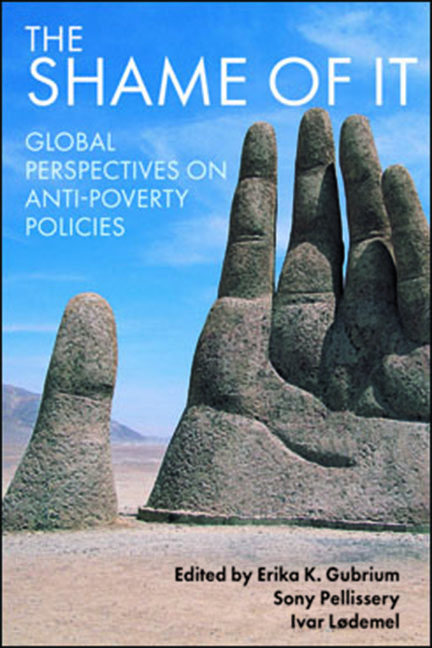Book contents
- Frontmatter
- Dedication
- Contents
- Notes on contributors
- Acknowledgements
- Preface
- one Resetting the stage
- two New urban poverty and new welfare provision: China’s dibao system
- three Thick poverty, thicker society and thin state: policy spaces for human dignity in India
- four Self-sufficiency, social assistance and the shaming of poverty in South Korea
- five ‘Not good enough’: social assistance and shaming in Norway
- six Pakistan: a journey of poverty-induced shame
- seven Separating the sheep from the goats: tackling poverty in Britain for over four centuries
- eight ‘Food that cannot be eaten’: the shame of Uganda’s anti-poverty policies
- nine Shame and shaming in policy processes
- ten Towards global principles for dignity-based anti-poverty policies
- Index
seven - Separating the sheep from the goats: tackling poverty in Britain for over four centuries
Published online by Cambridge University Press: 03 February 2022
- Frontmatter
- Dedication
- Contents
- Notes on contributors
- Acknowledgements
- Preface
- one Resetting the stage
- two New urban poverty and new welfare provision: China’s dibao system
- three Thick poverty, thicker society and thin state: policy spaces for human dignity in India
- four Self-sufficiency, social assistance and the shaming of poverty in South Korea
- five ‘Not good enough’: social assistance and shaming in Norway
- six Pakistan: a journey of poverty-induced shame
- seven Separating the sheep from the goats: tackling poverty in Britain for over four centuries
- eight ‘Food that cannot be eaten’: the shame of Uganda’s anti-poverty policies
- nine Shame and shaming in policy processes
- ten Towards global principles for dignity-based anti-poverty policies
- Index
Summary
Blaming and shaming: early ideological roots
The UK is a comparatively small, highly centralised state that operates a first past the post-electoral system. This, combined with strong party loyalty, typically provides ministers with largely unfettered authority to reform policy while in government. The electoral system has also delivered comparatively long spells of government, often lasting two or three five-year terms. This means that it is not unheard of for substantive policy programmes to be implemented and then radically reversed by opposition parties subsequently entering government with a mission and mandate for reform. This said, the potential for inchoate and reactive policy-making is partially mitigated by a stable civil service with a constitutional duty to critique policies proposed by ministers before assuming responsibility to implement them.
Perhaps more remarkable, however, is a legacy of social policy with respect to poverty that is traceable back to at least 1552. The comparatively early decline in the political influence of religious institutions in Britain meant that civil bodies, initially under the oversight of Justices of the Peace, took responsibility for meeting the needs of people experiencing poverty. These both reflected and helped to create a mindset that prioritised poverty relief above the more modern goals of social cohesion and egalitarianism. This would, in the late 19th and early 20th centuries, shape the broader development of welfare policies in other European countries (see, for example, Chapter Five, this volume). It also meant that, with the exception of the National Health Service (NHS), the universalist, insurance-based policies introduced as part of the post-Second World War settlement were to prove less durable than in continental Europe. While governments of the political left and right have since implemented policies premised on different ideological assumptions, they have for the most part unquestionably accepted a division between ‘the poor’ and the ‘non-poor’ and the need to differentiate among ‘the poor’ on moral grounds.
Himmelfarb (1984a, 1984b) argues that in Medieval England giving alms to ‘the poor’ was a religious duty that drew no moral distinctions among them. Such distinctions emerged later with the 1601 Elizabethan Poor Law, which categorised the ‘impotent poor’ alongside two groups of ‘able-bodied poor’ – those who could not work, the unemployed, and those who would not work, the ‘rogues and idlers’. These distinctions essentially coined the ‘deserving’–‘undeserving’ dichotomy.
- Type
- Chapter
- Information
- The Shame of ItGlobal Perspectives on Anti-Poverty Policies, pp. 133 - 156Publisher: Bristol University PressPrint publication year: 2013



